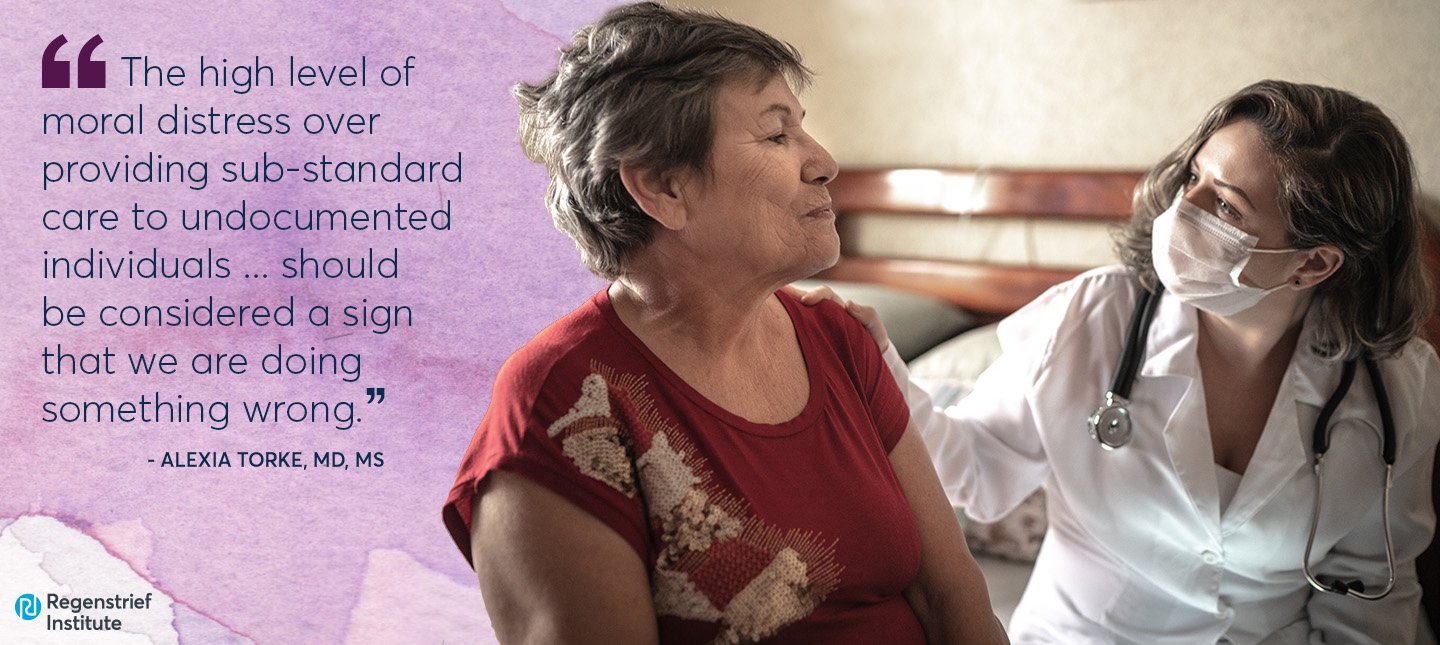In one of the first studies to explore clinician moral distress related to the ethically challenging provision of healthcare to undocumented immigrants, researchers from Regenstrief Institute and Indiana University School of Medicine surveyed physicians and nurses to assess their perspectives on treating end-stage renal disease in undocumented immigrants, a condition which Medicare covers for U.S. citizens regardless of age, but does not cover for undocumented immigrants.
Moral distress is an emotional experience in which an individual feels constrained from acting on deeply held beliefs, resulting in the sense of compromising one’s professional integrity. Moral distress has been correlated with traumatic stress, emotional exhaustion, burnout, depression and intent to leave a position or profession.
Nearly half (48 percent) of the clinicians surveyed in the new study indicated experiencing moral distress when required to provide only last resort emergent dialysis for end-stage kidney disease for undocumented immigrant patients rather than the standard care of thrice weekly intensive dialysis sessions covered by Medicare for U.S. citizen patients.
Under federal regulations, individuals, including those who are undocumented, cannot be refused care in an emergency department if they meet certain disease advancement criteria. In the majority of states, undocumented immigrants with end-stage renal disease receive only emergency dialysis. Clinical outcomes for undocumented immigrants receiving emergent dialysis show higher death rate, increased length of stay, and poorer quality of life than outcomes for those receiving standard three times a week dialysis.
The most common factor contributing to experiencing moral distress in provision of care to undocumented immigrants needing dialysis, cited by survey respondents, was the suffering of patients due to inadequate dialysis treatment. Other factors contributing to clinician moral distress included feeling constrained by laws and policies and being unable to act in the best interest of the patient.
“The current health care system in the United States places health care providers individually and collectively in a difficult situation in which their ethical obligation to care for all patients cannot be fulfilled within the current system due to current health care finance policies,” the authors of “High Moral Distress in Clinicians Involved in the Care of Undocumented Immigrants Needing Dialysis in the United States” wrote in the peer-reviewed study published in the journal Health Equity.
“Healthcare for undocumented immigrants is a polarizing issue, but one we – patients, clinicians and policy-makers — must discuss,” said Regenstrief Institute Research Scientist and IU School of Medicine Professor of Medicine Alexia Torke, M.D., M.S., senior author of the new study. “The high level of moral distress over providing sub-standard care to undocumented individuals with end-stage kidney disease should be considered a sign that we are doing something wrong.
“We need innovative solutions, changes in law and policy and a greater emphasis on prevention including blood pressure control, diabetes care and other strategies for end-stage renal disease in all populations.”
Half of the study survey respondents were doctors (attending physicians, fellows or residents) including internists, nephrologists (doctors who specialize in kidney disease), emergency medicine, critical care and palliative care specialists. The other respondents were overwhelmingly medical-surgical nurses. The mean age of all survey participants was 39 years. Nearly two-thirds of respondents were female.
“Providing substandard care in the form of emergent dialysis to patients with chronic kidney disease profoundly impacts the well-being of providers. We must talk about these ethically challenging issues collectively to prevent moral injury and burnout in providers,” said study first author Areeba Jawed, M.D., who trained in internal medicine, nephrology, palliative care and clinical ethics at IU School of Medicine. At the time of the study, she was an IU palliative care fellow and an assistant professor of internal medicine and a clinical ethicist at Wayne State University. She currently is an assistant professor at University of Michigan School of Medicine.
Authors of the study, in addition to Drs. Torke and Jawed are Sharon M. Moe, M.D., Melissa Anderson, M.D., and James E. Slaven, M.S., all of IU School of Medicine; Lucia Wocial of IU School of Nursing and Charles Warren Fairbanks Center for Medical Ethics IU Health; Fahad Saeed, M.B., B.S., of University of Rochester.
The authors conclude: “Emergent-only dialysis causes significant moral distress in clinicians. Legal and fiscal policies need to be balanced with the ethical and moral commitments of providers for ensuring standard of care to all.”
An estimated 4 percent of the U.S. population are undocumented immigrants. Approximately 6,500 of these individuals suffer from end-stage renal disease.
About Alexia M. Torke, M.D., M.S.
In addition to her Regenstrief appointment, Alexia Torke, M.D., M.S., is a professor of medicine and the associate chief of the Division of General Internal Medicine and Geriatrics in the Department of Medicine at IU School of Medicine. She also is the director of the Daniel F. Evans Center for Spiritual and Religious Values in Healthcare at IU Health.
About Regenstrief Institute
Founded in 1969 in Indianapolis, the Regenstrief Institute is a local, national and global leader dedicated to a world where better information empowers people to end disease and realize true health. A key research partner to Indiana University, Regenstrief and its research scientists are responsible for a growing number of major healthcare innovations and studies. Examples range from the development of global health information technology standards that enable the use and interoperability of electronic health records to improving patient-physician communications, to creating models of care that inform practice and improve the lives of patients around the globe.
Sam Regenstrief, a nationally successful entrepreneur from Connersville, Indiana, founded the institute with the goal of making healthcare more efficient and accessible for everyone. His vision continues to guide the institute’s research mission.
About IU School of Medicine
IU School of Medicine is the largest medical school in the U.S. and is annually ranked among the top medical schools in the nation by U.S. News & World Report. The school offers high-quality medical education, access to leading medical research and rich campus life in nine Indiana cities, including rural and urban locations consistently recognized for livability.









